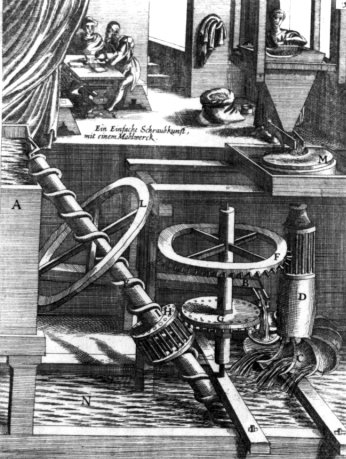Robert Fludd
Today, we meet the last alchemist. The University of Houston's College of Engineering presents this series about the machines that make our civilization run, and the people whose ingenuity created them.
By 1600 two forces rode a collision course. People like Galileo and Francis Bacon were just shaping modern experimental science. At the same time, medieval alchemy struggled to cope with all the change. In the century before, the alchemist Paracelsus had tried to change alchemical thinking from within.
But he still spoke the old language of magic and mysticism. Modern science needed a new language and new people. It needed people with clear eyes, ready to receive nature as it presented itself. The human imagination had to touch the hard earth for a season if we were to move ahead.
So, while we struggled to set up the Plymouth Colony in America, the last alchemists fought a losing battle in England. The most evident of these was Robert Fludd.
Fludd was as bombastic and difficult as Paracelsus had been before him. He was also the most rigid kind of fundamentalist. Since Aristotle was a pagan, everything he'd ever written was wrong. Plato had at least read the old Mosaic Bible texts. Maybe he had a little to say to us.
Fludd's claims about physical reality run an amazing gamut from crazy to insightful. Lightning, for example, was simply not to be understood in physical terms. It was the naked will of God. That's why it struck the people who didn't run and hide when they saw it.
But he also believed the sun -- not the earth -- was at the center of the universe. He said that our blood carries the lifegiving parts of air through our body in a circular motion. That was very close to the modern theory of blood circulation. Harvey gave us that theory only a few years later, and Harvey was Fludd's close friend.
Fludd proposed one of the famous perpetual motion machines. It worked like this: A water wheel grinds grain, and it pumps the water back into its own supply tank. If such a thing could work, you could lock the whole business in a room and it'd grind grain forever. You wouldn't need a stream.
Fludd was Europe's best known scientist in his time. When his ideas finally fell, it was because he didn't protect himself from the lightning bolts of change. Every 17th-century scientist we know about today took time out to attack Fludd's ideas. He was the lightning rod that called the new science down on alchemy. When he died in 1637, alchemy died with him.
And in that odd way, Robert Fludd did as much as anyone to bring modern science into being.
I'm John Lienhard, at the University of Houston, where we're interested in the way inventive minds work.
(Theme music)
Huffman, W.H., Robert Fludd and the End of the Renaissance. New York: Routledge, 1988.
Yates, F.A., Theatre of the World. Chicago: The University of Chicago Press, 1969.
Boorstin, D.J., The Discoverers. New York: Random House, 1983.
Debus, A.G., The English Paracelsians. New York: Franklin Watts, Inc., 1966, Chapter 3.
For more on alchemy see Episodes 76, 293, and especially 474, which deals with Fludd's precursor, John Dee. For more on Paracelsus in particular, see Episodes 511 and 610.

Image courtesy of Special Collections, University of Kentucky Library
A late 17th century version of Fludd's perpetual motion machine grinding grain as shown in Böckler's Theatre of New Machines